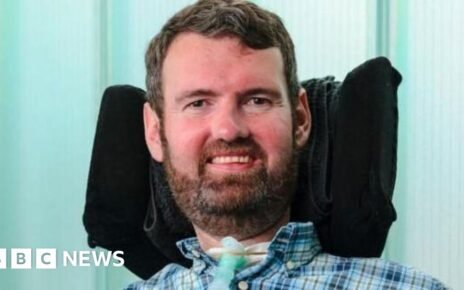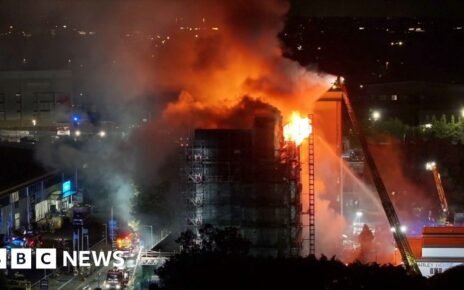By Davy Wilson, BBC News NI
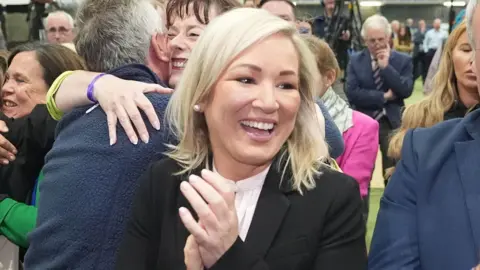 PA
PASinn Féin has replaced the Democratic Unionist Party (DUP) as Northern Ireland’s largest Westminster party after winning seven seats in the general election.
That is the same amount as the last election in 2019 but the DUP has lost seats in a disappointing night.
Ian Paisley is under serious threat of losing the North Antrim seat that has been in his family for more than 50 years.
Meanwhile the party lost its Lagan Valley seat, previously held by former leader Sir Jeffrey Donaldson, to Alliance’s Sorcha Eastwood.
In total, 16 of Northern Ireland’s 18 seats have been declared so far, with North Antrim and East Londonderry still to be declared.
The Labour Party has won a landslide victory with Keir Starmer set to become the new prime minster.
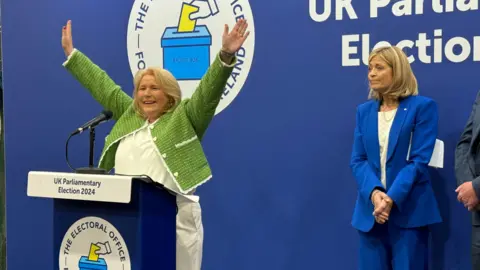
Who has been elected in Northern Ireland?
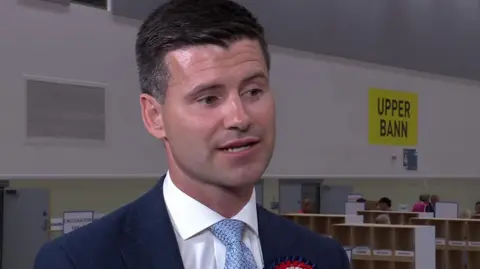
The first seismic result of the night came in Lagan Valley, where Sorcha Eastwood became both the first woman and first non-unionist MP.
She defeated the DUP’s Jonathan Buckley, who was contesting the election instead of Sir Jeffrey after he was charged with historical sex offences.
Ms Eastwood said she was delighted, saying the party’s result was a “huge achievement”.
“I am a Lagan Valley girl born and bred,” she added.
Mr Buckley said “boundary changes” and “divided unionism” lost him the seat.
The DUP also lost in South Antrim to former health minister Robin Swann, meaning the Ulster Unionists will return an MP to the House of Commons for the first time since 2017.
While North Antrim has not been declared, it is understood the DUP’s Ian Paisley is under serious threat of losing his North Antrim seat to Traditional Unionist Voice (TUV) leader Jim Allister.
BBC News NI understands Mr Paisley trails TUV leader Jim Allister by around 450 votes and has requested a partial recount.
The seat has been held by either Mr Paisley or his father, Ian Sr, for the last 54 years.
Elsewhere, here’s who have been elected in Northern Ireland:
- Sinn Féin’s Cathal Mallaghan was the first Northern Ireland MP elected, topping the poll in Mid Ulster
- DUP leader Gavin Robinson retained his seat in Belfast East despite the challenge of Alliance leader Naomi Long
- His DUP colleagues Carla Lockhart, Sammy Wilson and Jim Shannon retained their seats in Upper Bann, East Antrim and Strangford respectively
- Sinn Féin’s Órfhlaith Begley retained her seat in West Tyrone as did her party colleagues Chris Hazzard in South Down, John Finucane in Belfast North and Paul Maskey in Belfast West. Dáire Hughes also won for Sinn Féin in Newry And Armagh, replacing Mickey Brady who elected not to run
- Former nursing union boss Pat Cullen held Fermanagh and South Tyrone for Sinn Féin while
- The SDLP’s Claire Hanna also held onto her seat in Belfast South and Mid Down as did party leader Colum Eastwood in Foyle
- Independent unionist Alex Easton wins the North Down seat from Alliance’s deputy leader Stephen Farry
Analysis: Brendan Hughes – BBC News NI political reporter
In its 40-year history, only two people had ever been MP for Lagan Valley – now we have the third.
Alliance Party assembly member Sorcha Eastwood is the first woman and the first non-unionist to hold the seat.
Her predecessor, former Democratic Unionist Party leader Sir Jeffrey Donaldson, was MP for the area for 27 years.
Before him it was former Ulster Unionist Party leader James Molyneux.
Overturning the DUP’s majority is a significant win for Alliance, off-setting expected disappointment for the party elsewhere in North Down.
When will the remaining Northern Ireland results come in?
The first declarations arrived at about 03:40 BST despite expectations the first results would come at 02:00
It is believed most of Northern Ireland’s 18 MPs should be known by about 05:30.
However that depends on how tight the race is in some constituencies.
There are two constituencies yet to declare – East Londonderry and North Antrim .
In total, 136 candidates stood in Northern Ireland in the first general election since 2019.
It operates as first past the post, which means voters put an X in the box beside one candidate who they want to be elected to the House of Commons.
The number of registered voters in Northern Ireland was the largest it has ever been for a general election – 1,363,961.
How can I follow the results?
You can keep up to the date with the very latest across Northern Ireland via live coverage on the BBC News NI website, which began at 20:00. LINK
The live Northern Ireland results programme hosted by Mark Carruthers is being streamed on the website and also being broadcast on BBC One NI and the iPlayer.
The UK-wide results programme hosted by Laura Kuenssberg and Clive Myrie began at the same time on BBC Two and the BBC News Channel.
An extended edition of Good Morning Ulster will begin at 06:00 and will also be streamed on the BBC News NI Website, where live coverage will continue throughout Friday with analysis of and reaction to the full picture of results across Northern Ireland and the rest of the UK.



